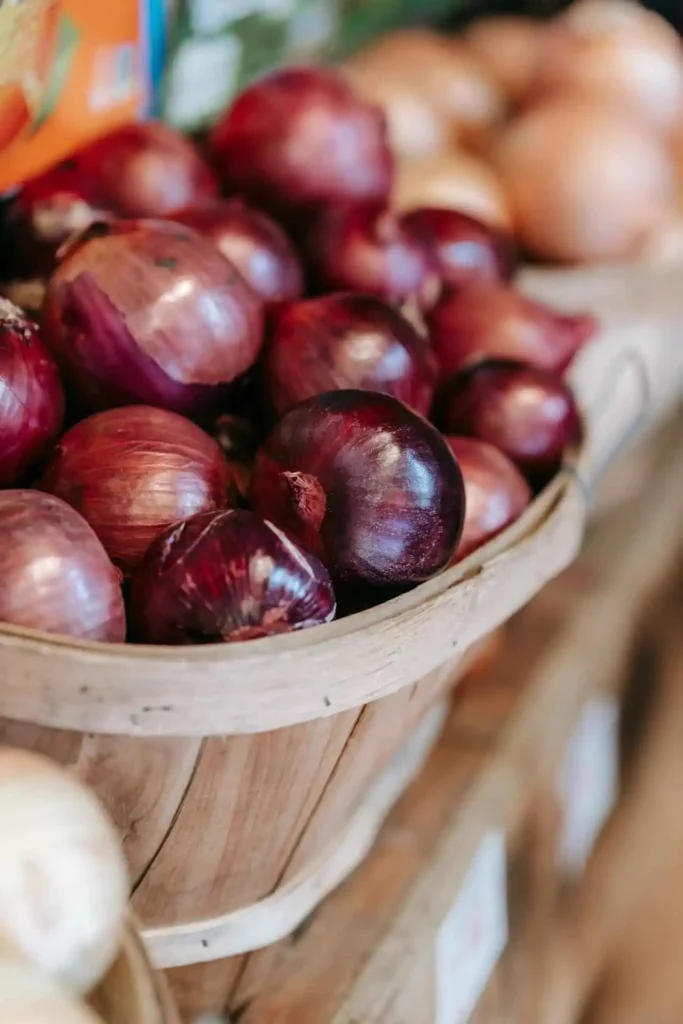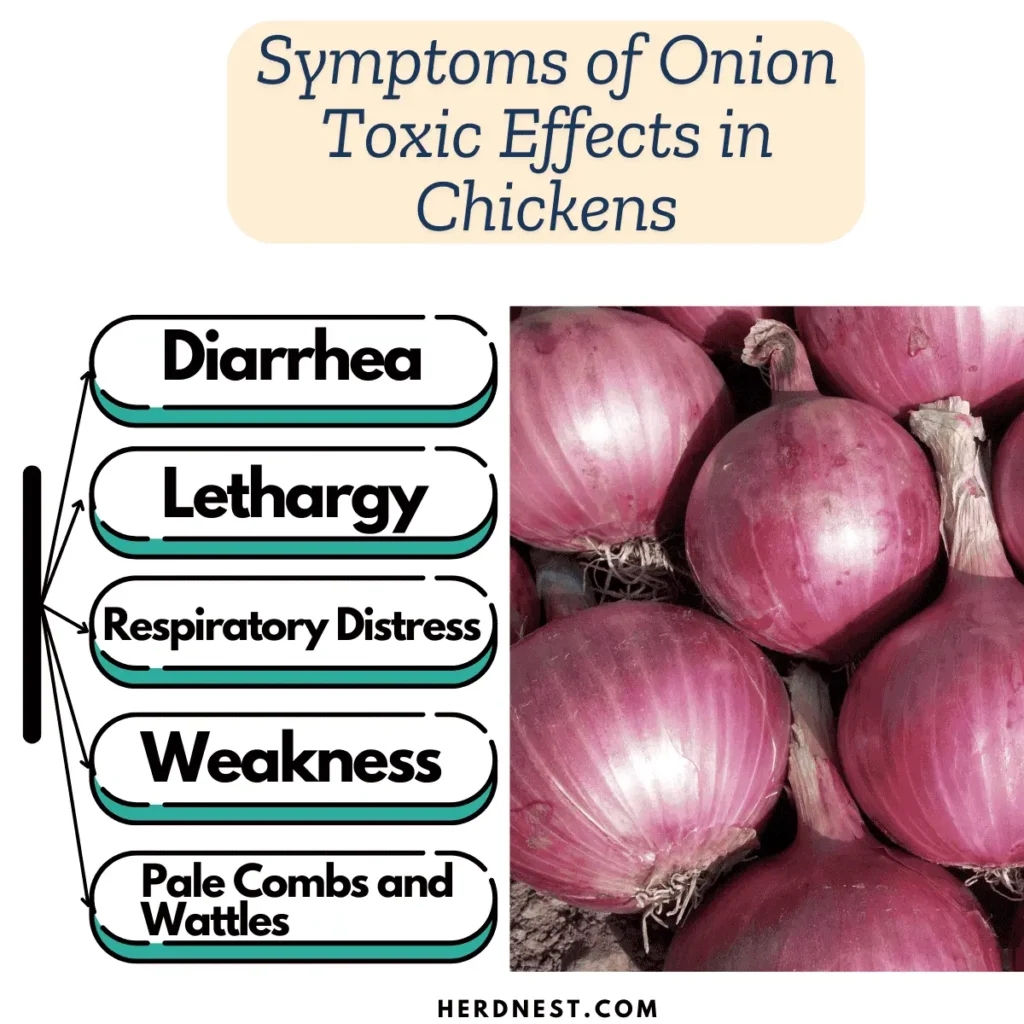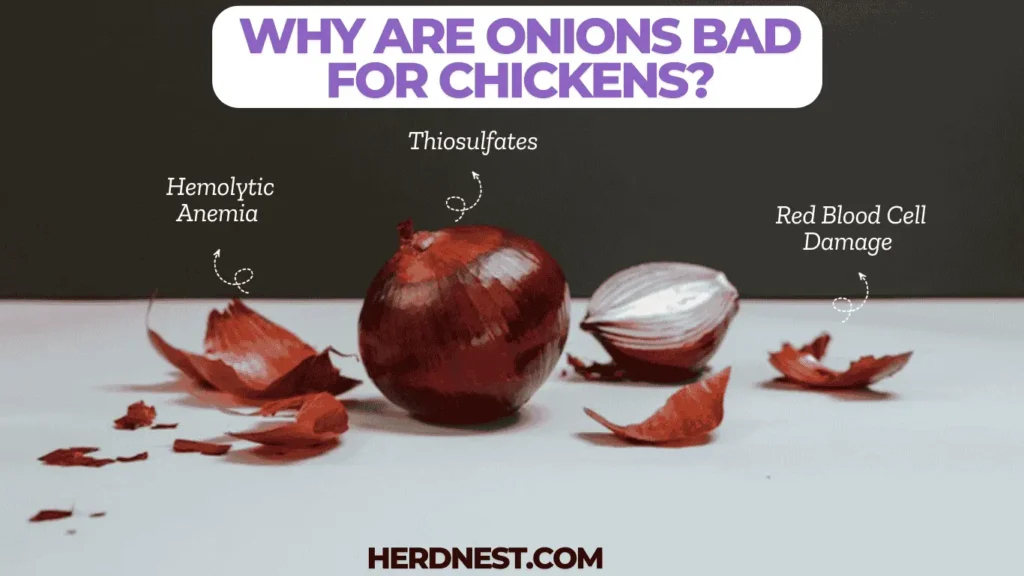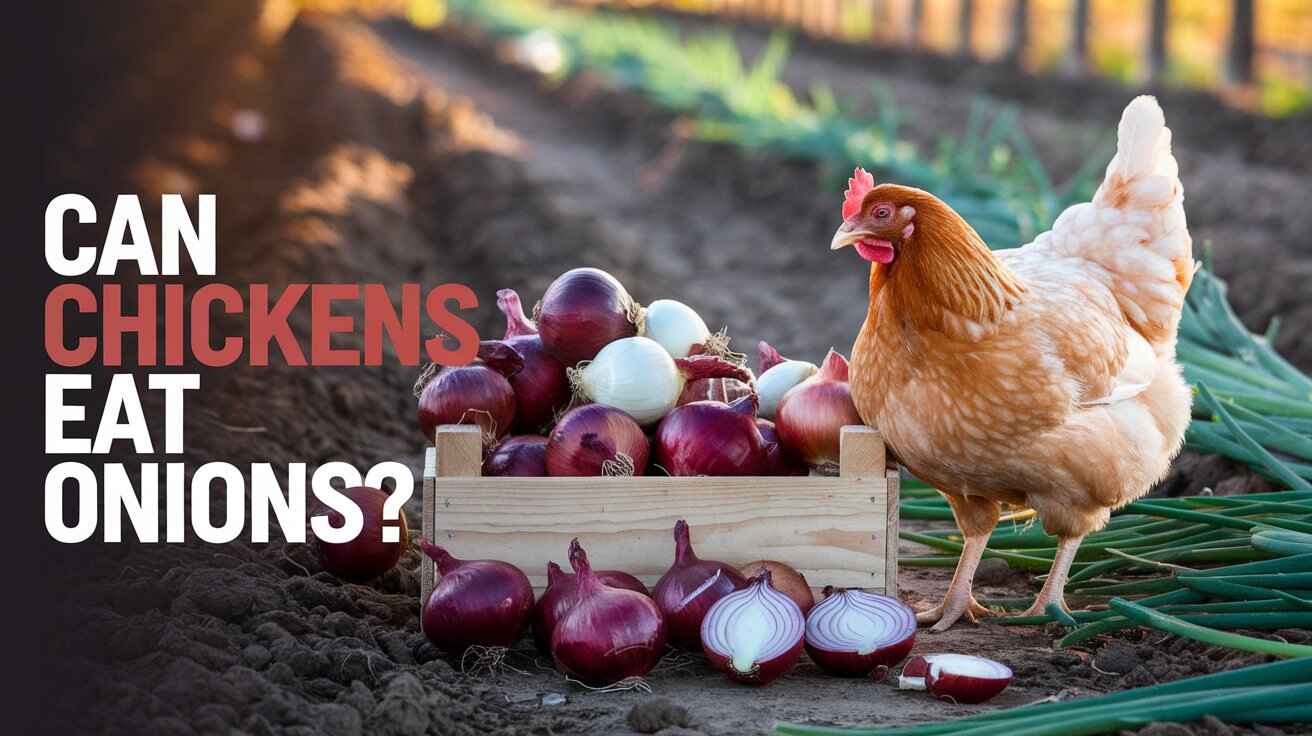Chicken-keeping in the backyard is a rewarding experience, providing not just a safe atmosphere for your beloved chicks but also fresh eggs every week. It’s a sustainable way of living, helping to reduce waste while offering plenty of opportunities to make the most of kitchen scraps.
However, the question remains: can chickens safely eat onions? Many owners wonder about feeding chickens leftover onions from their meals. While it may seem like a great idea to add them to their feed, onions carry certain risks that require careful consideration.
Balancing the healthy treats we provide and our responsibilities as chicken owners is key to their well-being. Using raw onions or cooked scraps might seem convenient, but understanding the consumption effects and finding the best approach to their diet is essential.
With some simple steps and reliable information, you can make informed choices and fuel your flock’s journey toward a healthier lifestyle.

Table of Contents
ToggleCan Chickens Eat Onions?
Many chicken owners often ask whether it’s safe to feed onions to their flock, and the short answer is no chickens can’t eat onions in large amounts. While onions may seem beneficial for their diet because they contain some nutrients, they also have compounds that are harmful if consumed in excess.
If you decide to provide onions, it’s important to understand that they should only be given in moderation, as a small portion of their overall food.
This entirely depends on your choice, but always note that onions are not a significant part of what chickens can safely eat. Before you think, “Let’s give them some,” take a moment to know why onions don’t suit their diet regularly.
Are Onions Safe for Chickens?
A chicken’s digestive system works quite differently compared to humans, which means that some food that’s good for us can be harmful to them. In the case of giving onions, when ingested in moderately high quantities, they can release certain toxins that may negatively affect chickens.
Understanding these differences is key to ensuring that onions don’t become a problematic part of their diet.
The Toxicity of Onions for Chickens
Onions are part of the Allium family, which also includes garlic, leeks, and chives. While they may seem like a tasty addition to our meals, they are not safe for chickens.
Onions contain compounds such as thiosulfate, which can be toxic when consumed in large amounts. If your chickens accidentally eat onions, you should watch for symptoms of toxicity, as it could pose serious health risks to them.

Symptoms of Onion Toxicity in Chickens
Chickens can’t eat onions, and it’s crucial to stay aware of the potential risks involved. Feeding them onions in excessive amounts may lead to serious side effects, as such consumption poses health risks associated with the toxic nature of onions. Make sure to note the symptoms and limit their exposure.
Diarrhea
Onion is harmful to chickens, especially when excessive intake occurs. It can irritate a chicken’s digestive system, leading to frequent and watery stools, which may result in severe dehydration if not managed promptly. Always monitor their health to avoid such issues.
Lethargy
Feeding onions to chickens poses a risk when consumed in high amounts. It can cause them to become unusually tired, inactive, and show a general lack of energy or enthusiasm for their usual activities. Watch for these signs and adjust their diet accordingly.
Respiratory Distress
Onions can seriously affect a chicken’s respiratory system, causing difficulty in breathing, as well as wheezing or gasping, which can become distressing. Such cases may require veterinary attention to ensure proper care.
Weakness
When chickens consume onions in excess, it can result in muscle weakness that hampers their ability to stand, walk, or even perform normal functions. Such overconsumption may potentially compromise their overall health, highlighting the importance of a well-balanced diet.
Pale Combs and Wattles
The toxins in onions can trigger a reduction in red blood cells, causing anemia that’s often noticeable through paler-than-usual combs and wattles. These symptoms suggest poor blood circulation and oxygenation.
If your chickens have eaten onions, it’s crucial to discontinue onions immediately and consult a veterinarian or an experienced chicken keeper for guidance. Whether raw or fried, carefully evaluate the effects of onions on their health to decide if they are truly safe.

Why Are Onions Bad for Chickens?
To understand why onions are harmful to chickens, it’s essential to consider the potential long-term effects of giving onion scraps to them regularly. Such practices could pose serious risks to their health over time.
Impact on Chicken Health
Although onions have some beneficial nutrients, they also contain compounds like N-propyl disulfide, which is particularly harmful to chickens. When consumed in excess, this compound causes oxidative damage to red blood cells, resulting in Heinz body anemia.
Symptoms like weakness and lethargy may appear, and in severe cases, it can lead to organ damage or even death. The severity of the effects often depends on factors such as the amount consumed, the chicken’s age and health, and whether the onions were cooked or raw.
Understanding both the immediate impact and long-term effects of continuous onion consumption is essential to safeguarding their health.
Long-Term Effects of Onion Consumption
Continuous consumption of onions can gradually weaken chickens, leaving them more susceptible to diseases and infections. To keep them healthy and productive, it’s best to avoid feeding onions altogether. Instead, consider offering safe, healthy alternative treats like fruits and vegetables to ensure good nutrition and provide a balanced feed for their well-being.
Expert Opinions: Can Chickens Eat Onions Safely?
According to the Merck Veterinary Manual and Experts, chickens should not eat onions or other foods from the Allium family, including garlic, due to the harmful compounds that can cause health issues such as diarrhea, lethargy, and respiratory distress.
However, the NIH suggests that onion extracts, when used carefully, might improve feather health and movement. A balanced diet rich in vegetables, fruits, grains, and proteins is crucial for keeping chickens healthy. Moderation with even safe treats, like grapes and pineapples, helps prevent digestive problems and supports overall well-being.
Conclusion
While onions might seem harmless, they are toxic to chickens and can lead to serious health issues. To keep your flock thriving, it’s better to opt for safe foods such as spinach, carrots, or berries, which provide a range of nutrients.
Gradually introduce new foods to their routine and prioritize a balanced diet to maintain their health. Ensuring your chickens stay happy, active, and productive starts with smart feeding choices. Have you tried adding alternatives to their meals? If so, share your experiences and help others raise healthier birds!




